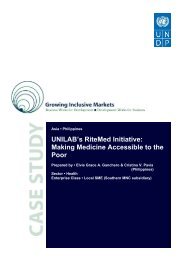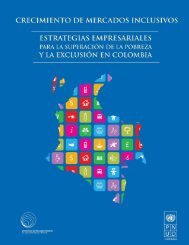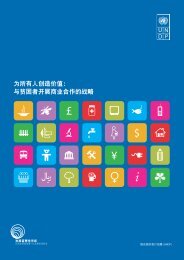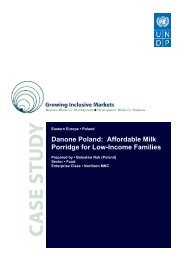Iran Kandelous 2011 - Growing Inclusive Markets
Iran Kandelous 2011 - Growing Inclusive Markets
Iran Kandelous 2011 - Growing Inclusive Markets
Create successful ePaper yourself
Turn your PDF publications into a flip-book with our unique Google optimized e-Paper software.
At the beginning, the company was merely collecting, cleaning and packaging around 40 types ofnatural plants using local labour, and then was selling the packages of dried herbs. The market forthese kinds of products was not so attractive because there was an alternative to buy them fromtraditional Persian herbal medicine shops (Attari, in local languages).In later years, essences, oils, capsules, cosmetics and syrups made from these plants were addedto the product portfolio. There was an increasing demand for such products in domestic andinternational markets as a substitute for chemical medicine. At this stage, the market demand washigher than the amount which was planted and natural capacity of the region could supply.In order to keep the sustainability of the regionand also respond to the growing demand, in1991 the company started establishing its ownfarm by buying lands from local people. Itbegan with the cultivation of two types ofexisting plants which later on extended to morethan 50 types. New medicinal plants asRosemarinus Officinalis, Aloe Vera, Echinaceaand Melissa were brought to the region and arecurrently planted in more than 100 acres of thecompany’s farm using modern techniques. Thelabour to work in the farm was supplied by the local community. The company trained the firstgeneration using on the job training methods. The current workers supervise and transfer theirskills to new employees. <strong>Kandelous</strong> keeps sourcing partially from independent farmers but thisshare is quite small compared to what it produces from its own land.In order to bring the products to the consumers (mostly high-income), the company uses ahierarchical model of exclusive representatives in each province. The company sets the pricingand advertisement policies and uses a performance-based contract with the wholesalers. Thiscontract shares the risks between the two parties. The distributor is responsible for meetingcertain sales targets and also an annual growth rate. On the other hand, the company pays apenalty if its production cannot meet the commitments made by the representatives to localcustomers.In the next layer, they work with drug-stores and traditional herbal shops (Attaris) to manageretail operation. Traditional herbal shops have benefited from <strong>Kandelous</strong>’ activities, since theoverall reputation of herbal medicine concepts has improved a lot by the company’s activities.Some of them use the brochures prepared by the company to introduce their own products.Case Study ● <strong>Kandelous</strong> Agro-Industry Group 7
















